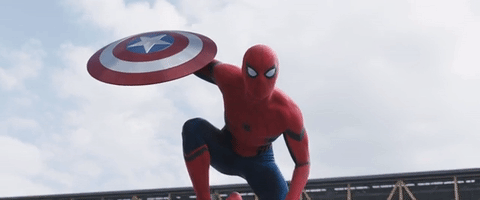
Last summer, one of my esteemed colleagues pondered if DC was set to wash Marvel. At the time, I agreed with the sentiment; aside from Ant-Man, things were looking sort of stale when it came to the progression of Marvel's Cinematic Universe coming out of Phase 2, while Suicide Squad had everyone going nuts with their full trailer (followed by a glorious, Queen-soundtracked edition that had us on the edge of our seats). But outside of the hype built by Harley Quinn and co., who's really checking for what the DC Extended Universe has in store, especially after the release of the latest Captain America: Civil War trailer, which closed with the first appearance of Spider-Man in the MCU?
It feels like whatever momentum we were feeling for DC back in July of 2015 isn't holding up nine months later. What happened? And how is Marvel able to, year-in and year-out, make films that feel like actual events as opposed to knee-jerk reactions to the established guard?
Part of that has to be with the idea of building their Cinematic Universe from the rip. When Iron Man first debuted in 2008, there were already seeds being sewn for extensions, like the SH.I.E.L.D. organization and Nick Fury's "Avengers Initiative." While each piece isn't conveniently bookmarked or highlighted in the films, when you take a step back and examine what Marvel is constructing with their releases, the picture becomes clearer. For example, sure, you know that Civil War dives into the death and destruction that occurred in the Avengers films, from the "The Incident" in New York City to the end of Age of Ultron, which featured all kinds of mayhem in a fake Eastern European town whose name I can't be bothered to look up [Ed. Note: It's called Sokovia, fam, obviously].
As in real life, in the face of multiple catastrophic incidents, the first order of business would be clamping down and/or regulating the superpowered beings who are causing the ruckus, right? Enter Civil War, where Captain America and Iron Man are on opposing sides of this Superhero Registration Act, a measure meant to place checks and balances on superheroes. While they could've just gone with an easy "COME SEE THESE TWO TEAMS OF SUPERHEROES FIGHT," there's actually some philosophical debate raging here. The end of Age of Ultron hit the members of the Avengers in different ways, and it looks like Civil War is the culmination of a number of different storyline strands.
And then there's the matter of Marvel's strategy for character development. While it's engaging to see different Avengers draw lines in the sand, it's even more interesting to see the emergence of Black Panther, who's entrance in the Marvel Cinematic Universe has been a well-played, slow burn of a mystery.

While not confirmed (yet), it's interesting to speculate that this is T'Challa, the Wakandan king who also moonlights as the Black Panther (and is seen later going ham on Bucky Barnes on a motorcycle). For those who actually made it through Age of Ultron, you'll remember that a major chunk of the film took place in Wakanda (because vibranium), and was capped off with a massive Hulk vs. Iron Man battle through the streets, thoroughly demolishing the city like they had C4 for fists. Marvel's so ill that even when they're introducing new characters, they're doing it in a way that actually ties into the ultimate story, turning an anticipated introduction into something major by laying the proper groundwork for his entrance.
I know what you're saying: "But DC is in the process of literally building their Cinematic Universe—give them a minute." I get it, and I hate jumping the gun, but the idea of a Cinematic Universe should be more than "these films take place in the same universe." For all of the trailers and press that Batman v. Superman: Dawn of Justice or Suicide Squad has been given, do we know how these films actually connect? DC has already dropped the ball by building an Arrowverse for their DC TV properties that seems to have no bearing on what happens in the DC Extended Universe, while the multiple TV properties in the MCU play directly into what's going on in the films.
Ultimately, it feels like the DC Extended Universe has MOMENTS, while Marvel is creating amazing MOVEMENTS. I don't know about you, but the reason I'm excited for Suicide Squad isn't because of the story of a team of supervillains being assembled for a black ops mission—it's entirely about Margot Robbie's Harley Quinn, or what Jared Leto is doing as the Joker. Meanwhile, Marvel's Avengers is admittedly weak in terms of excitement, but the ramifications of what happens in Civil War feel much more important, and you can immediately see the strands of how Phase 3 could play out over multiple properties, on top of having great characters like Black Panther and Spider-Man to look forward to. And that's even before mentioning how subtly and expertly Marvel is weaving the stories of Jessica Jones and Daredevil into the grander scheme.
DC is throwing all of their eggs into one basket, hoping that they'll fall into a gold mine. They aren't being patient; they aren't building a solid foundation from which their universe can blossom. They're throwing very loud, noisy things at us—Batman and Superman are fighting!—and while that guarantees immediate buzz, that excitement quickly fizzles into ambivalence.
If anything can be learned from Marvel's Cinematic run, it's that these amazing characters need to be thrown into engrossing stories, first and foremost. Right now, DC's Extended Universe sounds like a grand idea, but comes off like a reaction to Marvel Comics sonning them in the movie lane. Hopefully they have their ducks in a row, because when Spider-Man grabbed Captain America's shield, I felt like calling it a wrap for DC altogether.

But it's cool, because right after the Captain America trailer dropped, Fox tweeted this:
No thanks.

